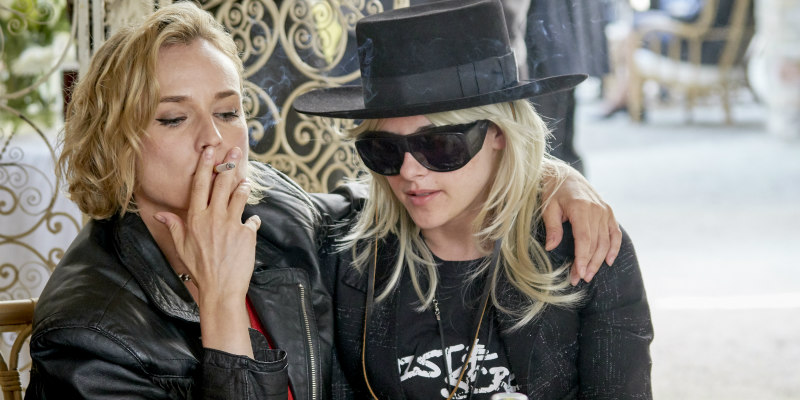
The true story of the infamous literary hoax.
Review by Benjamin Poole
Directed by: Justin Kelly
Starring: Kristen Stewart, Laura Dern, Jim Sturgess, Diane Kruger, Kelvin Harrison Jr., Courtney Love

I was fooled, too. In the early 2000s when 'Sarah' was published in the UK and music and fashion magazines went bonkers for this explicit story of a young boy following in the stiletto footsteps of his prostitute mother who worked the grimy truck stops of West Virginia, I, just like everyone else in the know, lapped up this trailer-trash gothic, this exploitation poetry. Furthermore, the novel was made all the more excitingly authentic by the persona of its author, JT ‘le Terminator’ LeRoy, a damaged cherub in a blonde fright wig and perennial shades, whose gleefully reported background of poverty, drug use, and emotional and sexual abuse was irresistibly synergistic to the book’s transgressive plot. And so, LeRoy’s image featured heavily in The Face, id, Interview et al; lingering grunge musicians adopted LeRoy as a mascot of alternative legitimacy; and Asia Argento even went and made a film with him (and, allegedly, the rest). Egg on everyone’s face then when it came out a few years later that there was in fact no such person as JT LeRoy, and the character was a marketing construct concocted by the actual writer of the books ('Sarah', and two other similar works) and her tiny, androgynous sister-in-law. Yes, I was suckered in, but in my defence, I was just a kid: a slightly precocious little boy who was hungry for trendy, confrontational art and literature. I didn’t know any better: the whole project was tailor made for would be edgelords like me. Looking back, and watching Justin Kelly’s JT LeRoy, a drama based upon the literary charade, and seeing just how slapdash the whole pantomime was, you do wonder what everyone else’s excuse was in believing the glaringly obvious hoax.


JT LeRoy’s credits inform us that the film is based upon Savannah Knoop’s memoir, she who was the sister-in-law adopting the persona of the male JT LeRoy for publicity purposes. And so, we pick up with Savannah as she visits her brother, whose wife Laura Albert has already started publishing under the JT LeRoy pseudonym. With a bit of cajoling (the extent of which the film sort of fudges - we’ll return to this), Knoop is persuaded to embody the persona of this epicene ingenue. This role essentially involves standing about looking photogenically weird while prompted by Albert (played by God Laura Dern) to answer interview questions. It aids the film enormously that Knoop is played by Kristen Stewart. While I can’t quite buy into the KStew cult, in JT LeRoy her woodenness and soulful eyes are put to their best effect as the awkward, guileless teen drawn into a world of celebrity duplicity and sex with filmmakers (also, whether she’s playing a boy or a girl, she always looks hot AF). As the film continues, Knoop prevaricates about whether she should keep up the gender-blending pretence, a quandary which becomes more loaded when a feisty European director played by Diane Kruger shows both an interest in the film options for the stories and ‘LeRoy’ himself (of course, IRL, Asia Argento made The Heart Is Deceitful Above All Things, based on Albert’s collection of short stories; however, in JT LeRoy the film director is called Eva, not Asia, and Kruger is German while Ms. Argento is Italian, so they can’t be the same person, honestly your honour, no way etc).

Two aspects of the JT LeRoy phenomena remain interesting and potentially instructive, and both features are explored to a greater or lesser extent in Kelly’s film. The first is how quickly the books became an (almost negligible) extension of the brand, which was all but predicated upon the cartoony image of the author. It’s likely that more people ended up just reading the liner notes that ‘LeRoy’ supposedly wrote for '90s music survivors like Marilyn Manson, Billy Corgan and… Bryan Adams (?) than the published novellas. That’s going to piss off the actual author and architect of the entire pantomime, corresponded in the movie by an understandably put out Albert (I can’t bring myself to look at the books now, of course, but I would imagine that they could at least still go toe to toe with the wimpy, poor-me solipsism of today’s YA fiction). The second aspect, less successfully portrayed, is how credulous everybody involved was… Hmmmm. It’s almost as if everyone actually wanted to believe the homegrown sexual abuse stories, the horrific experiences of this poor kid. Like it conferred a thrilling and gritty danger by proxy upon those involved (et tu Winona, Madonna, Bono? Hahahaha!). Like nobody wanted to point out the emperor was wearing a thrift shop wig and plastic penis bone necklace. Side note: fair play to the great Courtney Love (looking increasingly like Cameron Diaz staring into a spoon), who in the film gamely plays a Hollywood denizen taken in by the scam, making light of her real-life complicity in the story. What a sport!
To date there have been two (superior) documentaries about the above events. And the problem that JT LeRoy faces is making a dramatic film out of a captivatingly bizarre real-life story already layered with mendacity without adding another patina of perspective which further distorts the meta-fiction; e.g. there is no mention of LeRoy’s supposed HIV positive status in this film, a highly distasteful fabrication. If the original story was a load of old bananas, why should we now believe JT LeRoy’s revisionism? Based upon the subjective memoirs of Knoop (she receives a co-writing credit), the movie represents her as an innocent caught up in events, with Albert as a slightly unhinged task master. Poor Knoop: having fame-not-fame thrust upon her (the LeRoy persona relied on heavy, ridiculous disguises which preserved her anonymity), travelling the world for free and getting to have sex with honestly-not-Asia-Argento. It must have been torture for her. Moreover, this victim narrative configures the hoax as something damaging to the sanctity of art, and Albert as a washed-up author whose prefabrications were indicative of sad desperation, and not, as they most certainly were, playful distractions which, at the time, made for entertaining reading and, in retrospect, to paraphrase Cherry Lips Garbage’s (best) song written about LeRoy, shone a light on the hidden parts of celebrity culture and the patronising gullibility of the literati. This was the era of god-awful confessional literature, after all, where genuine suffering was fetishised within the best seller charts (I’ve never read them but I’m thinking of how 'A Boy Called It' and 'Angela’s Ashes' were marketed). Was Albert having to fashion a character who was readily adoptable by the misery porn, novelty obsessed culture of the era any different from Emily Brontë forced to publish as Ellis Bell in the patriarchal 19th century?


Of course, with the best will in the world, Albert and Knoop weren’t canny satirists attempting to subvert persona led publishing. In the film, as in real life, they’re a pair of harmless goofballs, so much so that you root for them all the way. Perhaps the outrage persists because books were the chosen medium: po-faced, seriously considered literature. After all, such questions of authenticity affect pop music in a different way. Does anyone really believe that Daft Punk are actually robots, or that Bowie was an alien? JT LeRoy nonetheless seems uninterested in the wider implications of the swindle, which is surely the only reason for lingering interest in the LeRoy story. Instead, the film prefers to eke out a soapy take on the spectacular chicanery, which, true to the duration of the original hoax, goes on a little bit too long to be credible.

JT Leroy is in UK cinemas August 16th.
"Transcends its misguided identity politics with electric performances and compelling if undeniably manipulative storytelling."— 𝕋𝕙𝕖𝕄𝕠𝕧𝕚𝕖𝕎𝕒𝕗𝕗𝕝𝕖𝕣.𝕔𝕠𝕞 🎬 (@themoviewaffler) August 10, 2019
THE PEANUT BUTTER FALCON is in UK cinemas October 18th.
Read @hilliseric's reviewhttps://t.co/1bVCoNs583 pic.twitter.com/ulrNkGffDB

